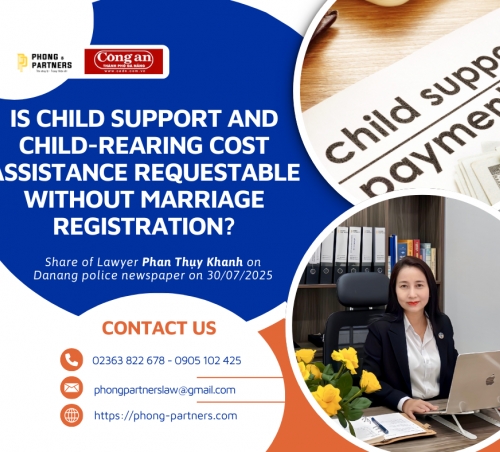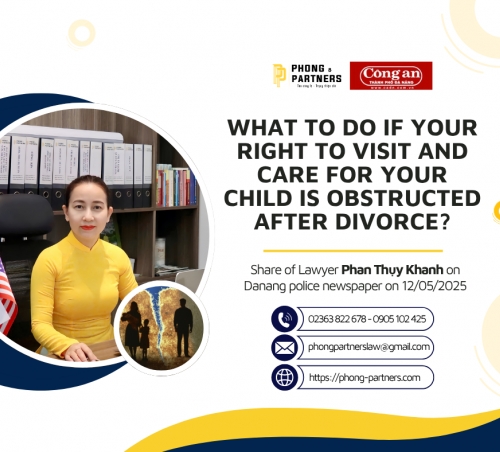Lawyer Ho Thi Huong Sen – Lawyer at Phong & Partners Law Firm, responds:
Leasing residential property is one of the most common types of transactions, especially in major cities. As a result, disputes related to rental agreements occur frequently, arising from objective circumstances, intentional breaches by one party, or simply due to a lack of legal knowledge by the parties involved. In many cases, tenants suffer disadvantages in disputes with landlords simply because they are unaware of the relevant legal provisions. Situations in which a landlord wishes to sell the leased property while the lease term is still valid, such as in Ms. Thu’s case - are quite common and can significantly affect the tenant. Ms. Thu may refer to the legal advice provided by the lawyer below.
First, is the lease agreement between Ms. Thu and the landlord legally valid?
According to Article 472 of the 2015 Civil Code, a house lease contract is an agreement between the parties whereby the lessor delivers the property to the lessee for use over a specified term, and the lessee is obligated to pay rent.
- Regarding the form of a house lease contract, Article 163 of the 2023 Law on Housing provides: “Housing-related contracts shall be agreed upon by the parties and must be made in writing…”
- At the same time, Clause 2, Article 164 of the 2023 Law on Housing also stipulates the conditions for the validity of housing-related contracts as follows: “In cases where an organization donates houses of gratitude, charity houses, or great solidarity houses; purchases, sells, or lease-purchases housing that is public property; purchases, sells, or lease-purchases housing where one party is an organization, including social housing, housing for the people’s armed forces, or resettlement housing; contributes capital in the form of housing involving an organization; or enters into contracts for leasing, borrowing, gratuitous use, or authorization to manage housing, notarization or certification of the contract is not required, unless otherwise requested by the parties.”
According to the aforementioned provisions, a house lease contract must be made in writing but is not required to be notarized or certified. Therefore, the lease agreement signed between Ms. Thu and the landlord is legally valid. Both parties have rights and obligations in accordance with the contract, the Civil Code, the Law on Housing, and other relevant legal regulations.
Second, does the landlord have the right to sell the property while it is under lease?
A house lease contract is an agreement between the parties. Accordingly, if the lease agreement includes a provision prohibiting the landlord from selling the property during the lease term, the landlord is not permitted to sell the leased property. In cases where the contract does not contain such a provision, the landlord has the right to sell the property during the lease term but must comply with the relevant legal regulations, specifically:
Clause 1, Article 168 of the 2023 Law on Housing regulates the sale of leased residential property as follows: “In cases where the owner sells a house that is currently under lease, they must provide written notice to the tenant regarding the sale and the conditions of the sale; the tenant shall have the right of first refusal if they have fully paid the rent to the lessor up to the time the notice of sale is given, unless otherwise provided by the Civil Code. Within 30 days from the date the tenant receives the notice, if the tenant does not purchase the house, the owner shall have the right to sell the house to another party, unless the parties have agreed otherwise regarding the time period.”
Accordingly, the owner of a leased property has the right to sell the property but must provide written notice to the tenant regarding the sale and the relevant conditions. This notification requirement is intended to protect the tenant’s rights and to afford them the opportunity to purchase the leased property if they wish to do so.
The tenant has the right of first refusal to purchase the leased property if they have fully paid the rent to the landlord up to the time the landlord gives notice of the intended sale. However, this right of first refusal only applies if there are no other provisions in the lease agreement or different stipulations under the Civil Code. If the tenant does not wish to or is unable to purchase the property within 30 days from the date of receiving the notice, the owner may proceed to sell the property to another party.
In addition, the parties may agree on a period longer than 30 days if they wish; in the absence of such an agreement, the property owner has the right to sell the house to a third party upon the expiration 30 days from the date of notification. This provision is designed to protect the rights of both parties to the lease agreement: the lessor has the right to sell the property, and the lessee has the right of first refusal.
Thus, the landlord has the right to sell the leased property, but they must comply with the required notification procedures and ensure Ms. Thu’s right of first refusal. The landlord may not unilaterally sell the property without informing Ms. Thu and must wait until the priority period has expired before selling it to another party.
Third, does Ms. Thu have the right to continue the lease if the landlord sells the leased house?
Clause 2, Article 173 of the 2023 Law on Housing provides for the right to continue leasing as follows: “In cases where the owner transfers ownership of a leased house to another person while the lease term is still valid, the tenant shall have the right to continue leasing the property until the end of the lease term; the new owner shall be responsible for continuing to perform the lease agreement previously signed, unless otherwise agreed by the parties.”
Accordingly, when the owner sells a house that is currently under lease to another party, the tenant retains the right to continue the lease until the end of the lease term. This means that even if the property is sold to a new owner, the tenant may remain in the property for the duration of the lease, unless otherwise agreed by the parties. The new owner is responsible for continuing to perform the terms of the existing lease agreement, including maintaining the agreed-upon rental conditions such as rent amount, lease duration, and other tenant rights. This provision is intended to protect the interests of the tenant for the remainder of the lease term.
Thus, in the absence of any other agreement, Ms. Thu shall have the right to continue the lease with the new owner until the expiry of the lease term, and the new owner must assume all rights and obligations of the former owner under the lease agreement.
Fourth, what should Ms. Thu do if the new owner refuses to continue performing the lease agreement?
As analyzed above, when the landlord sells the leased property to another party, Ms. Thu still has the right to continue the lease of the property until the expiration of the lease term. The new owner is obligated to continue performing the lease agreement and must respect and fulfill all the terms of the lease previously concluded between Ms. Thu and the former landlord. In the event that the new owner refuses to perform the lease agreement, Ms. Thu should take the following steps:
Step 1: Direct negotiation and discussion
Ms. Thu should engage in direct discussions and negotiations with both the former and new landlords to reach a mutually acceptable agreement that ensures the interests of all parties involved. Such an agreement may include compensation for Ms. Thu for the damages caused by not being allowed to continue the lease until the end of the contractual term; protection for the former landlord from becoming involved in legal disputes; and a smoother, faster transition of ownership for the new landlord without incurring time and costs associated with dispute resolution.
With regard to the former landlord, Ms. Thu may discuss their obligation to ensure her right to lease the property until the end of the lease term, as stipulated in the contract, as well as their obligation to provide prior written notice before selling the property, in accordance with the legal provisions analyzed above. She may also request that the former landlord be held liable for compensating any damages she has suffered or for paying a contractual penalty, if such a clause exists in the lease agreement.
With the new landlord, Ms. Thu should also engage in discussions and explain the relevant legal provisions regarding the obligations of the new owner, as analyzed above, so that the parties may reach a mutually agreeable and appropriate resolution.
Negotiation should be prioritized, as it is the most cost-effective, time-efficient, and least burdensome solution for resolving the dispute.
Step 2: Filing a lawsuit with the competent People’s Court
If negotiations are unsuccessful, Ms. Thu may initiate a lawsuit before the competent People’s Court to protect her lawful rights and interests, specifically:
- In the event that Ms. Thu wishes to continue leasing the property but the new owner refuses to perform the lease agreement previously signed, she has the right to file a lawsuit requesting the Court to order the new owner to continue performing the lease contract.
- At the same time, Ms. Thu also has the right to file a lawsuit against the former landlord, requesting compensation for damages and contractual penalties (if provided for in the lease agreement) for unilaterally terminating the lease before its expiry and failing to provide prior notice of the sale.
Note: Ms. Thu should retain the original lease agreement, documents evidencing rent payments, and any relevant notices (if any), as these are important pieces of evidence during the dispute resolution process at the Court.
In conclusion, Ms. Thu still has the right to continue leasing the property until the end of the lease term, even if the property has been transferred to a new owner. In the event that the new owner refuses to allow her to continue the lease, she has the full right to file a lawsuit to protect her lawful rights and interests. However, if Ms. Thu wishes to remain in the property while the new owner does not want to continue the lease, this may create various difficulties for her in the future. Therefore, she should carefully reconsider whether to continue leasing the property. Above all, she should first attempt to negotiate with both the former and new landlords to find the most appropriate and mutually beneficial solution for all parties involved.















